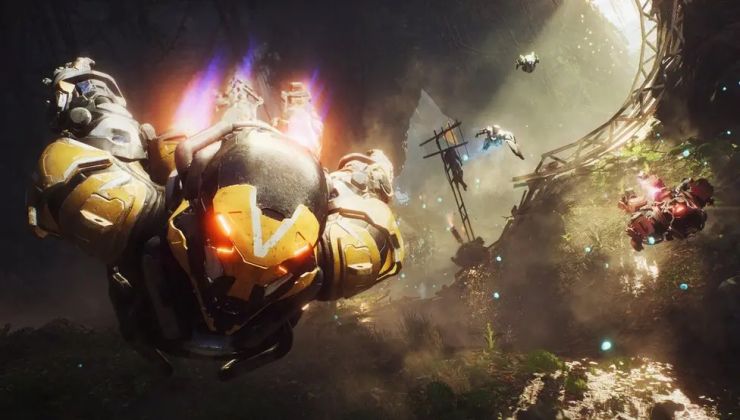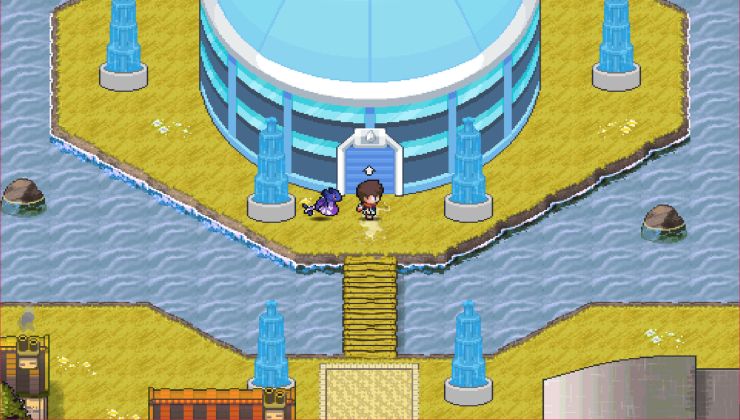The team working on Godot Engine have released the first snapshot of Godot 4.3 which brings with it some big rendering changes that sound quite exciting overall.
According to the post they've done a "Major refactoring of the rendering system (GH-83452), which paves the way to several big improvements coming soon", one of which linked in the post is a collaboration with Google and The Forge to further improve Vulkan.
There's also now a new Direct3D 12 rendering driver, multiple controllers can now contribute to input actions, node groups can now be configured project-wide, freed objects are now treated differently from null in comparison operators, loading of scenes with corrupted or missing dependencies will no longer be aborted and an infamous bug causing areas to lose signal connections when pausing/unpausing the game has been fixed.
Meanwhile W4 Games, the company started up by some of the core Godot team, has announced their pricing for console port support for Godot. It's good to see a proper option out there now, as console support for Godot was something of a sore point for developers. The pricing may be a bitter pill to swallow for solo developers considering it's $800 just for a single console up to $2,000 for the big three together (and that's every year too), pricier still if you're a bigger team or if you have a publisher.
They did catch a fair bit of flak for it across social media that I saw, with multiple developers believing such console port support should have come from the Godot Foundation, not a separate company set up specifically to turn a profit like W4 Games (who have investors now). These developers mentioned the conflict of interest between the Godot Foundation and W4 Games, considering some people work for both. Various sources of developers not happy with it: #1, #2, #3 and so on.
For comparison on the pricing (specifically for console support):
- Unity: minimum $2,040 per-person per-year, plus the Runtime Fee or or 2.5% of your game’s monthly gross revenue when you hit $1,000,000 (USD) gross revenue on a trailing 12 month basis and 1,000,000 lifetime initial engagements.
- Game Maker is $800 a year.
- Unreal Engine is free until you hit the 5% revenue share (lifetime gross revenue from that product exceeds $1 million USD).
- Defold is completely free.
Worth noting as well of course Godot is open source and no one is forced to use W4 Games, and any other company could make cheaper console ports too.
What are your thoughts on this?
This situation specifically is largely due to the console companies, Nintendo, Sony, and Microsoft (in this order of being guilty) having a monopoly-like hold on their respective store platforms.
Many folks do not realize how good we all have with PC and also partly with Steam. This is the closest to democratized and decentralized we can get under free market economy.
While PC as a platform makes it possible for you to:
- develop a game relatively easily with hundreds of possible pre-made engines, libraries, asset editors and other tools
- publish it by yourself on your own website or choose between dozen digital storefronts
Steam also offers:
- low, fully refundable one-off publishing fee
- high process and data transparency
- publicly documented platform integration tools
- additional features for no additional cost (think Proton, Remote Play, friends system, Big Picture, universal gamepad support, overlay etc.)
- free platform discoverability & visibility (algorithm will surface the game to the right players if the game will be very positively received and reaches certain threshold), aka free marketing
None of this is possible on the mainstream consoles. You can guess why.
I mean, they wanted a way, aside from donations, to fund Godot. That's basically either using so called "intellectual property laws" to coerce people into paying for what's basically a post-scarcity thing (software) -obviously in case you want to use it) or offer paid up services that are actually based on scarce resources (they also offer multiplayer infrastructure as far as I know). The fact that the console walled garden model offered them a way to do just that offering the service of porting a game in exchange for money (the other way would be to give the binary for free, but just the binary). It's perfectly fine and this was advocated since day 1 as the model of doing business with free software. No "IP law" is going to stop you from doing the same for free or at a lower price, and people can joint develop a library for doing just that and keep it their secret or internal software that gets used to port to consoles.
People should be mad at Sony, Nintendo and Microsoft for the NDAs, not at W4 for offering the service of porting your game to their consoles for a fee. Were not for the NDAs, that code would be on mainline Godot
Last edited by robertosf92 on 22 Dec 2023 at 5:51 pm UTC
Quoting: Nateman1000Open source creative software can not exist under capitalism and be successful if there is NO finances except for donations. Apart from a few you NEED a product to sell to have the money to maintain a project that bigI think if you look over the cases of open source software, even "creative software" that is successful, examples of that not being the case show up. These days they always seem to have "foundations" or stuff, but those exist mainly to wrangle the donations.
So for instance, I'm pretty sure Blender does not derive its success from a paid product. If anything, I'd say the existence of a company selling a paid product as a major adjunct to the open source project is more the exception than the rule. Wine has Codeweavers . . . but even there, I get the impression lately that Codeweavers spends less time selling their actual product and more time taking commissions to improve aspects of Wine from companies like Valve . . . i.e. acting kind of like it was a foundation wrangling targeted donations.
As long as Godot's development remains independent of W4's console efforts, I'm content.
Quoting: Purple Library Guyblender has more money and is a larger project. Only recently has Godot really gotten bigQuoting: Nateman1000Open source creative software can not exist under capitalism and be successful if there is NO finances except for donations. Apart from a few you NEED a product to sell to have the money to maintain a project that bigI think if you look over the cases of open source software, even "creative software" that is successful, examples of that not being the case show up. These days they always seem to have "foundations" or stuff, but those exist mainly to wrangle the donations.
So for instance, I'm pretty sure Blender does not derive its success from a paid product. If anything, I'd say the existence of a company selling a paid product as a major adjunct to the open source project is more the exception than the rule. Wine has Codeweavers . . . but even there, I get the impression lately that Codeweavers spends less time selling their actual product and more time taking commissions to improve aspects of Wine from companies like Valve . . . i.e. acting kind of like it was a foundation wrangling targeted donations.
Quoting: Nateman1000That strikes me as an entirely different argument. You said open source creative software can not exist under capitalism without a product to sell. Clearly it can, and indeed that is the more normal state. If you're now saying such software can only exist if it's a really big project, that's a different claim . . . and also false. How do you think big projects become big, anyway? Obviously they existed as small projects and middle sized projects before they became big projects.Quoting: Purple Library Guyblender has more money and is a larger project. Only recently has Godot really gotten bigQuoting: Nateman1000Open source creative software can not exist under capitalism and be successful if there is NO finances except for donations. Apart from a few you NEED a product to sell to have the money to maintain a project that bigI think if you look over the cases of open source software, even "creative software" that is successful, examples of that not being the case show up. These days they always seem to have "foundations" or stuff, but those exist mainly to wrangle the donations.
So for instance, I'm pretty sure Blender does not derive its success from a paid product. If anything, I'd say the existence of a company selling a paid product as a major adjunct to the open source project is more the exception than the rule. Wine has Codeweavers . . . but even there, I get the impression lately that Codeweavers spends less time selling their actual product and more time taking commissions to improve aspects of Wine from companies like Valve . . . i.e. acting kind of like it was a foundation wrangling targeted donations.
Moving to this particular case, the implication that even Godot needs this project is almost certainly not true. Godot has been seeing strong, sometimes spectacular, growth in capabilities, mind share, donations, everything. It shows no sign of slowing down.
Don't get me wrong, I don't actually have anything against this company. Sure, with any commercial venture the jury has to stay out--there's always a good chance they'll turn evil at some point, and if they go public it's pretty much certain. But I don't have anything against the basic concept, given the way certain megacorporations run consoles. And it may mean that Godot can extend to the console environment where it wouldn't have been able to without something like this, again because of the way consoles are locked down. But that's a long way from the really big general claim you made.
Q: What if my company publishes/updates more than one game per year?
A: You can publish and update as many games as you want as long as your license is current.And if you stop paying, your game will still be available on the console from what I understand. You just won't be able to update it. It might eventually get taken off if you need to update it to comply with the console's standards, but I don't know how common that is. And anyway, they actually permit you to update the game for that express purpose (but it would probably be pretty hard without access to the repositories):
Q: What rights do I lose when my subscription ends?
A: Under the Starter and Pro licenses, when you stop paying, you lose access to the W4 console repositories. You are also not permitted to publish or further update any game you have published with our ports, as long as you’re using any part of the W4 Games codebase for that specific platform. If your company desires more permissive terms, this can always be arranged with an Enterprise license. For non-content patches (with the exclusive intention of keeping the game compliant with the current SDKs), post-launch, no license is required. However, keep in mind you won’t have access to the repositories if you don’t have an active license.
If you want to have free console development, support Steam Deck.
Last edited by Pecisk on 29 Dec 2023 at 1:50 pm UTC
Quoting: AdutchmanI don't think these pricing changes are very expensive. Keep in mind that the main alternative is Unity, which charges 1877 dollars per seat. Meanwhile W4 charges 800 dollars to port all your games with bug handling and the legal stuff taken care of. I can think this is not an unnecessary luxury with console companies, as I imagine their SDKs/rules to be quite finicky to get right. As for the Defold situation: they crucially do not guarantee bug fixes and/or legal help. I think 800 dollars is definitely worth it to have a guarantee that your game will keep working on all platforms, also from a sustainability standpoint.Legal rule coverage and SDK support is pretty much a must when you do console port. Engine might be open source, but hardly anyone wants to handle Sony/Microsoft/Nintendo pro bono. It is proper minefield and you will want expertise on your side when planning port for these platforms.
Quoting: Purple Library GuyI think majority of income comes from companies that provide consultation and training for Blender, also Blender Foundation has some paid training available as well.Quoting: Nateman1000Open source creative software can not exist under capitalism and be successful if there is NO finances except for donations. Apart from a few you NEED a product to sell to have the money to maintain a project that bigI think if you look over the cases of open source software, even "creative software" that is successful, examples of that not being the case show up. These days they always seem to have "foundations" or stuff, but those exist mainly to wrangle the donations.
So for instance, I'm pretty sure Blender does not derive its success from a paid product. If anything, I'd say the existence of a company selling a paid product as a major adjunct to the open source project is more the exception than the rule. Wine has Codeweavers . . . but even there, I get the impression lately that Codeweavers spends less time selling their actual product and more time taking commissions to improve aspects of Wine from companies like Valve . . . i.e. acting kind of like it was a foundation wrangling targeted donations.
Unless it is government sponsored - I wish - these projects will need some revenue stream, directly, or indirectly. As long as there is balance between commercial interests and community, it is viable strategy and way to practically deliver open source product.
Last codebase update in 2022, the following on github describing their owm codebase:
* Linux Ubuntu 18.04 LTS with Vulkan 1.1
Their github looks like of somebody who never did software development having .exe of installers publicly available anyway hosted there (7zip)
Last edited by STiAT on 1 Jan 2024 at 4:31 am UTC
Quoting: ObsidianBlkHonestly, W4 charging that amount to port to the consoles doesn't bother me. If I developed a game I felt could bring in the money, then 2k a year shouldn't be that bad. Additionally, if I could find another group that can port for cheaper, W4 is not standing in my way to go that alternate route.One of the bones of contention is that they are not independent: some people are working on both. To some extent I suspect it's unavoidable to mix (doing console work you'll eventually run into problems with the general infrastructure), but I can understand why some people see it as a conflict. Certainly things can get muddy if they're not careful.
As long as Godot's development remains independent of W4's console efforts, I'm content.








 How to setup OpenMW for modern Morrowind on Linux / SteamOS and Steam Deck
How to setup OpenMW for modern Morrowind on Linux / SteamOS and Steam Deck How to install Hollow Knight: Silksong mods on Linux, SteamOS and Steam Deck
How to install Hollow Knight: Silksong mods on Linux, SteamOS and Steam Deck